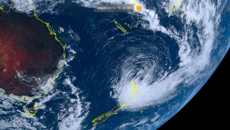LISTEN TO CALLER SONJA TALK WITH ANDREW DICKENS ABOVE
The Government's goal of one million Kiwis speaking basic te reo by 2040 is achievable but needs the resourcing to back it up, the head of the Māori Language Commission says.
Maihi Karauna, the Crown's draft Māori language strategy, was launched this month and along with boosting widespread reo levels it set targets of 150,000 Māori speaking it as a primary language, and for te reo to become a key element of national identity.
At the 2013 census 148,400 people could hold a basic conversation in te reo, 84.5 percent of whom identified as Māori.
Prime Minister Jacinda Ardern revealed this week her baby, Neve Te Aroha, would be raised to speak te reo Māori and English.
Ardern said it was important to her and her partner Clarke Gayford that Neve has an understanding of Māori culture and believes speaking Te Reo is the first step.
Te Taura Whiti i te Reo Māori/Māori Language Commission tumuaki (CEO) Ngahiwi Apanui said te reo was increasingly regarded as part of the national identity.
"New Zealanders, whether they are speakers or not are increasingly celebrating te reo Māori as something that sets us apart from other similar nations.
"People have pride in their bilingual passports. Nothing says: 'I am from New Zealand' more than te reo Māori."
The target of one million New Zealanders speaking basic te reo was achievable.
"Many people they find they already have a basic vocabulary – to have basic Māori language only sentence structures and common phrases need to be added."
A 2013 Statistics New Zealand survey found 257,500 (55 percent) of Māori adults were able to speak more than a few words or phrases, up from 153,500 in 2001.
Of those, 50,000 Māori could speak about almost anything, or at least many things in Māori.
"As these people and new graduates of schools, universities, wānanga and community-based courses continue to develop their Māori language skills it is entirely possible the Māori will become their primary language, especially in settings where there are other Māori speakers," Apanui said.
While the goals were achievable, there needed to be a boost in resources.
Many kura and wānanga around the country were at capacity for te reo courses, and even had waiting lists.
"The draft points to the need for increased resources, and we know demand is already stretching what we have," Apanui said.
"More and better teachers and technology and more online audio, video and writing in te reo Māori is what we need.
"In the end it will depend on government decisions and the goodwill and support of the New Zealand people."
Māori Development Minister Nanaia Mahuta said the draft strategy was open for Kiwis to share their views on.
"I encourage everyone to have their say on the future of our language and how the Crown can help to protect, promote and secure its future.
"When I think of my young children growing up it is increasingly important to ensure that more Kiwis connect and reflect our common identity through valuing the indigenous language and culture of our country."
Take your Radio, Podcasts and Music with you









